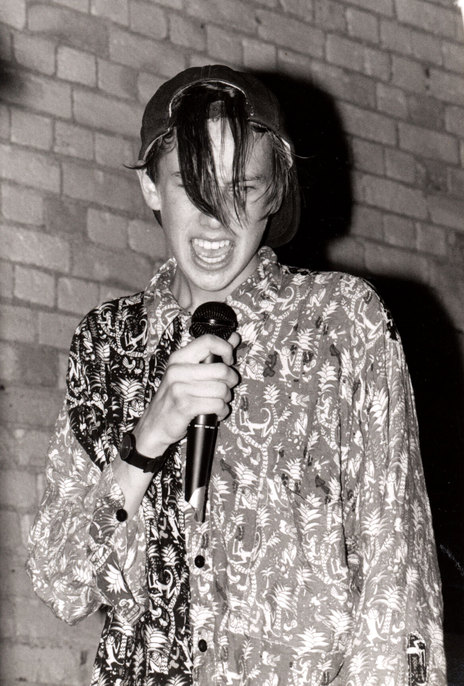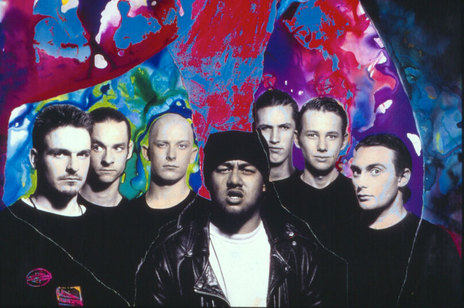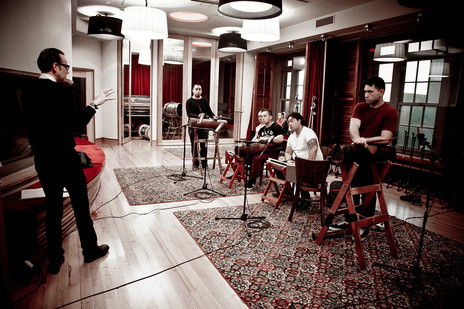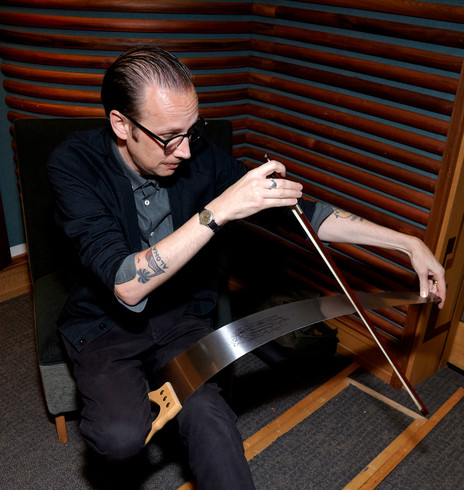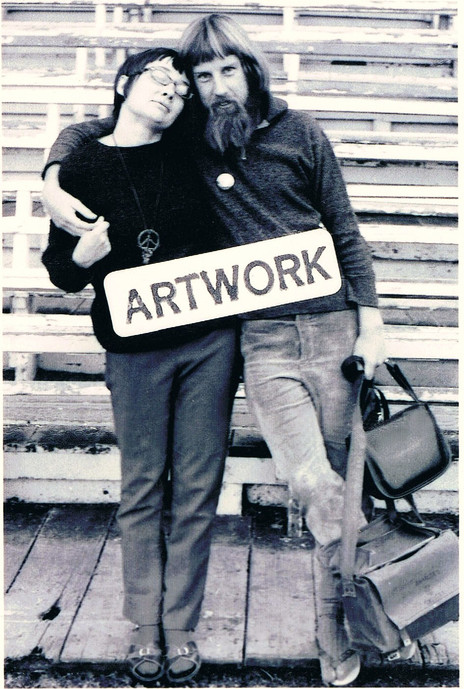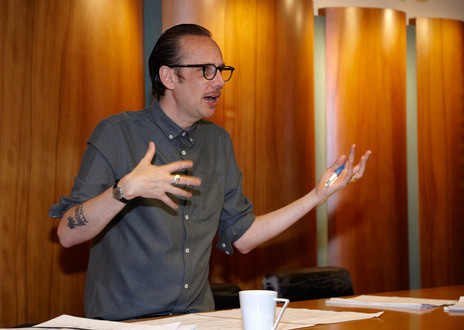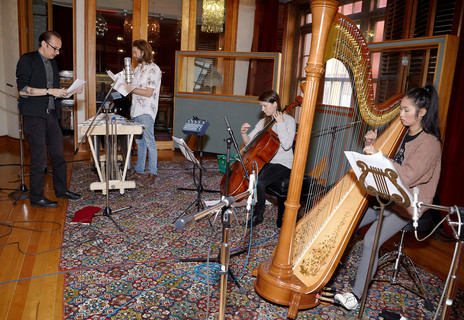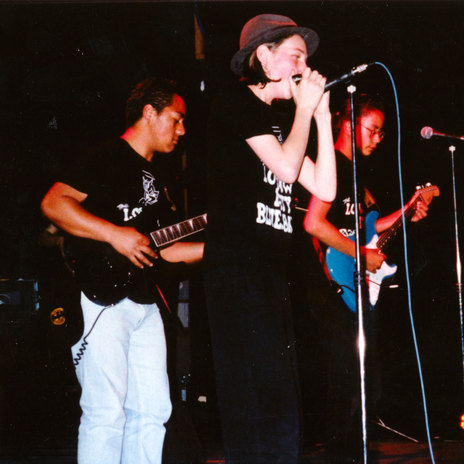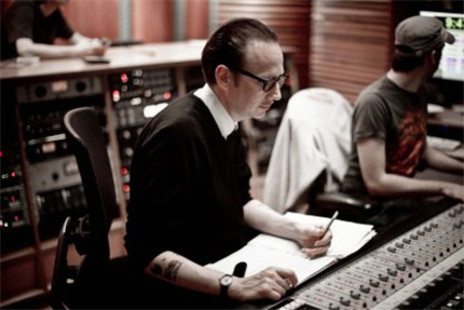His early love of music led him to leave his original high school (Seddon) to move to Selwyn College, since he heard they had a good music programme. He joined a few school friends to form the Lowdown Dirty Blues Band and played gigs in the central city (at places like Ponsonby’s Java Jive), before the same line-up achieved even greater success with their funk group, Supergroove. Around this time, Steven approached Glyn Tucker at Mandrill studios to see if he could get work experience in music production. This led to Steven quitting school in sixth form (year 12) and making music his fulltime career.
While at Mandrill, Stevens had his first opportunities to create music for ads and television shows.
While at Mandrill, Stevens had his first opportunities to create music for ads and television shows. He wrote theme tunes for Skits, Inside New Zealand and Open Door, as well as composing music for Wahine: the Untold Story. But his studio work was constantly interrupted by having to tour with his band and when an extensive run of shows was booked to support the ‘Scorpio Girls’ single in mid-1993, Tucker was forced to let him go.
While at Mandrill, Steven met producer Malcolm Welsford, who worked on some of the biggest New Zealand releases of the 1990s while behind the desk at York Street Recording Studios. This led to an ongoing working relationship that started with Steven mastering albums that had been recorded at York Street, including groundbreaking works such as Churn (1993) by Shihad and Eye TV (1993) by The Nixons (aka Eye TV). When Supergroove came to record their 1994 debut, Traction, Welsford was hired to help Steven with production duties. The album went on to sell 70,000 copies and the band also accrued a substantial audience overseas following successive tours of Asia.
However, the members of Supergroove gradually outgrew the confines of playing with the same friends from when they were 15 years old. This led to a controversial re-shuffle of the line-up, though the subsequent album (Back Spacer, 1996) still reached No.2. Supergroove continued on, but was increasingly caught up in the machinations of the music industry (with labels, lawyers and managers on board) and, by the following year, Steven found himself sick of the entire endeavour so decided to quit altogether. Instead he turned his attention to studying philosophy at university. However he didn’t immediately retire from music. For example, he produced the hit single ‘Bursting Through’ for Bic Runga (and ‘All Fall Down,’ which turned up on Try To Remember Everything, 2008), and he worked with student radio favourites Thorazine Shuffle on their debut album Your Own PR (1999).
He also continued to write music for ads and television shows right up until 2000 when he was accepted to undertake a PhD in Roman and Greek Philosophy at the prestigious Cambridge University. While overseas, Steven rediscovered his love of the blues and went back to the artists he’d loved as a teenager. Among them were early bluesmen who moved up from the Delta – such as James Cotton and Big Walter Horton – who started playing their harmonicas through amps. When he returned to New Zealand in 2007, he shared some demos he’d recorded with local musician friends and this led to the formation of garage/surf/blues act The Drab Doo-Riffs.
When these sessions went well, the pair joined with Caoimhe Macfehin (Drab Doo-Riffs) to form Heart Attack Alley.
Steven’s friend Lubin Rains (from The Vietnam War) suggested that he should also meet up with the group’s guitarist, Kristal Gallagher, since she’d expressed an interest in jamming with a harmonica player. When these sessions went well, the pair joined with Caoimhe Macfehin (Drab Doo-Riffs) to form Heart Attack Alley. They went on to sign with legendary Swiss Label, Voodoo Rhythm Records who arranged for them to record an album in Italy and then the trio toured Europe twice, though the strain of being on the road led to the demise of the group in late 2012.
In the intervening years, Steven also returned to composing music for television (he took his first job just before leaving the UK). In the early 2010s, he produced a run of albums by artists as diverse as rockers Svelte, alt-country act The Vietnam War, alt country legend Bernie Griffin and rapper Tourettes; he also mixed albums by Tyson Tyler and R.E.S.
In 2012, Steven and his wife decided to move to her family’s farm in Thames. The decision was driven by the rising costs of rent in Auckland, as well as their desire to home-school their autistic daughter. The move also gave Steven the opportunity to set up his own studio nearby and his soundtrack work continued at pace.
One of his collaborations was with his former Supergroove bandmate Joe Lonie (who learnt directing through making the band’s videos). Steven handled music supervision for Lonie’s award-winning short film, Honk If You're Horny (2012). The following year, Steven received a professional development award from APRA which he put towards attending the ASCAP Film Scoring Workshop at New York University. He also branched out by creating audio-pieces for Radio New Zealand about the different parts of the orchestra, the musical saw, and the ukulele.
His growing confidence as a composer meant his work rate picked up massively, including writing the score and organising the music for the six-part police drama Harry (finalist for best original music in a TV series at the APRA Silver Scrolls 2014). He also composed music for the eight-part series Tatau (which aired on BBC Three and BBC America) and a long list of local shows (Bombshell: The Sinking of The Rainbow Warrior, How To Murder Your Wife, Venus and Mars, and The Monster Of Mangatiti). More recently, he composed music for 800 Words, a show primarily created for television in Australia and this resulted in him winning Best Original Music in a TV Series at the 2016 APRA Silver Scroll Awards. However he may have reached his widest audience with the full-length sci-fi comedy This Giant Papier-Mâché Boulder Is Actually Really Heavy (2016), which won awards at festivals throughout the world despite its low budget.
In 2013, he started a new group, Queen Neptune, with his former Drab Doo-Riffs and Heart Attack Alley bandmate, Caoimhe Macfehin: his sister-in-law, who had also moved back to the family farm. Macfehin had an old song she wanted to rework (‘Beg Me To Stay’) and Steven saw it as an opportunity to explore his love of vintage synth sounds. They gradually recorded songs for an album (Queen Neptune, 2017), but there didn’t seem an obvious way to perform the songs live, so it was only in 2016 – when an opportunity to play a show at Wine Cellar came up at the last minute – that the pair finally pieced together a live act.
The awards kept coming for Steven over the following years. The music he made for television shows saw him win the APRA Best Original Music in a Series Award/Tohu Paerangi for The Bad Seed in 2019 and for Black Hands in 2021 (at the Silver Scrolls), while Resolve won Best Original Score at the NZ TV Awards. He was equally active as a film score composer, winning the Silver Scroll for Best Original Music in a Feature Film for Come to Daddy and working on high profile projects such as The Justice of Bunny King and Bellbird.
Steven also made the music for these soundtracks available online under the name “Karl Sölve Steven” and it led him to put up other works as a solo artist. The result was the mini album, All of Human Emotion on Microfiche (2022). While Steven did sing on some tracks including ‘Tamaki 5000’, mostly his voice appeared in other ways, providing the digitally warped vocals for ‘Acoma (Phase I)’ and a spoken word dialogue for ‘The Message’. The project even brought him back together with Supergroove bandmate Che Fu, who provided scratches and samples (including the King Kapisi line “lifestyle’s in the speech”) for a track that ruminates on the topic of language, ‘Utterance and Inscription’.
Karl Steven has been making his living from music for the majority of his adult life. This has required reinventing his approach to music time and again, though he has seldom put a foot wrong. Looking back over his remarkable catalogue of musical works, it soon becomes clear that Steven is a tunesmith of the highest order, whose creativity will no doubt lead to even more new and interesting works in the decades to come.
Watch Ross Cunningham's interview with Karl Steven
